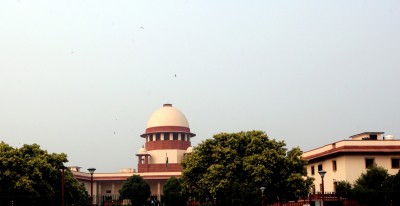Amaravati/New Delhi, Sep 21 : The Andhra Pradesh government has moved the Supreme Court against the state high court’s gag order on media as well as the stalling of investigation in an Anti Corruption Bureau (ACB) case involving a former advocate general (AG) and others.
“The AP government has filed a petition in the Supreme Court against the AP High Court order barring media from reporting on an FIR filed by the state’s ACB against a former AG and 12 others,” said a statement.
Hours after several media reports were published last Tuesday about an alleged Amaravati real estate scandal of more than 4,000 acres, involving some influential people amassing lands in the Capital Region Development Authority (CRDA) during the erstwhile Telugu Desam Party (TDP) regime, the high court issued the gag orders.
The high court order said that no media house, including social media users, should publish anything about the ACB FIR which incriminated 13 people.
Apart from the gag order, the ACB was restrained from proceeding with the investigation.
According to the official statement, legal experts have raised nine questions over the high court’s gag order and stalling of investigation.
Some of the legal questions include whether an accused person has the right of hearing even before the registration of an FIR under the provisions of the CrPc?
“Can the investigation process against any person be stayed when there are prima facie allegations against him in an FIR,” said the statement.
Other questions include whether protection orders can be granted to such an accused person who has not even approached the court of law? Also, whether the Advocates Act, 1961 offers any protection to an advocate accused of committing cognizable offences under the Indian Penal Code (IPC).
The Andhra Pradesh government prayed to the apex court to quash the gag order and also the stay, explaining its perspective in detail.
“It is settled law that even if a complaint is politically motivated, it cannot be quashed if it is otherwise maintainable. The high court grossly erred in not even referring to the contents of the FIR,” said the statement.
According to the state government, the high court entertained the petition even before the registration of an FIR in the Amaravati land scam case.
“Investigation is the domain of the probe agencies and the courts should not interfere until the investigation is complete. However, the high court has proceeded to issue a slew of directions without even examining the contents of the FIR, which on bare perusal reflect that a massive scam has taken place,” the statement claimed.
In the particular ACB case, the government told the apex court that a writ petition was filed in anticipation of an FIR.
“Such a petition was completely unprecedented and not maintainable and ought to have been dismissed. However, as mentioned above, the petition was entertained and a slew of directions were passed,” the statement said.
On the barring of investigation in the case, the state government referred to the Imtiyaz Ahmed vs State of Uttar Pradesh case (2012).
“The power to grant stay of investigation and trial is a very extraordinary power given to the high courts and the same power is to be exercised sparingly only to prevent an abuse of the process and to promote the ends of justice,” it said.
The statement further stated that the Andhra Pradesh government approached the Supreme Court against the unprecedented high court order after major sections of the legal and media fraternities questioned the legitimacy of the gag order and the stalling of investigation.
Disclaimer: This story is auto-generated from IANS service.

